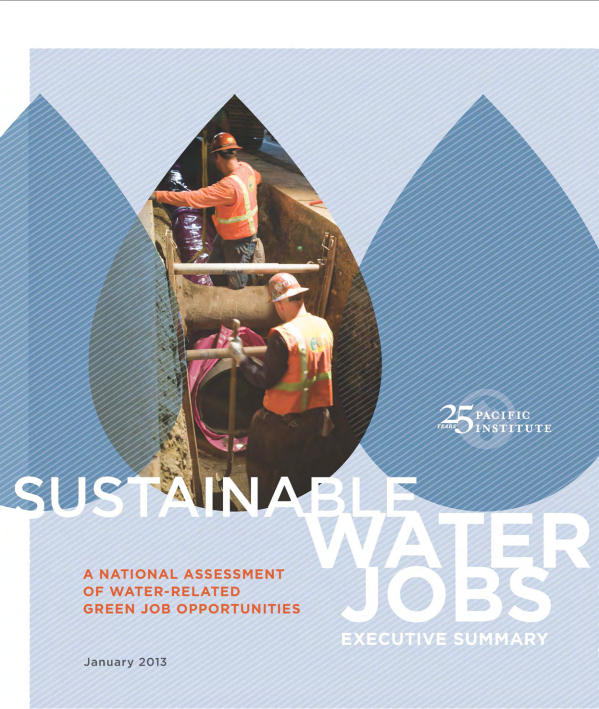Invest in the future. And especially, invest in sustainable, effective job creation in the water sector. The result will be millions of new jobs – a significant result.
That is the key message from a new analysis just released today by the Pacific Institute on sustainable water jobs in the United States. That study, Sustainable Water Jobs: A National Assessment of Water-Related Green Job Opportunities, finds that proactive investments increasing efficient water use, improving water quality, expanding smart water treatment and re-use, and more will address growing problems associated with failing water infrastructure, deteriorating water quality, severe drought, and flooding, as well as create jobs in a wide range of professions.
The study identifies 136 different kinds of jobs at all levels of skill: from plumbers to landscapers, from technology specialists and engineers to irrigation experts. Thirty-seven of these job types are also projected to have high growth in the overall economy, with each offering more than 100,000 job openings across the country by 2020. That’s millions of new jobs.
The Pacific Institute identifies numerous sustainable water occupations that are accessible to workers without advanced degrees. Twenty-seven of the 37 occupations with 100,000 job openings by 2020 generally require on-the-job training, with some requiring previous experience and associate’s degrees or technical training, but not bachelor’s or graduate degrees. This translates to a more feasible pathway to employment for adults without formal education beyond high school – one of the groups around the U.S. suffering from especially high un- or under-employment.
One of the authors of the study, Eli Moore, noted
“This research indicates that water policy can expand demand for workers without bachelors or advanced degrees if occupational training programs and pathways to jobs are created.”
The study finds each investment of one million dollars in alternative water supply projects yields 10-15 jobs. The same million dollars invested in stormwater management would produce 5-20 jobs; in urban conservation and efficiency, 12-20 jobs; in agricultural efficiency and quality, 15 jobs; in ecosystem restoration and remediation, 10-70 jobs.
“Preparing people who need work to install and maintain water-saving devices and projects can heal our communities environmentally and economically,”
said Annette Williams, Director of BEST Academy at the New York-based organization Sustainable South Bronx. BEST Academy has trained people to work in river restoration, construction of rain gardens, and other water-related fields.
The report also looked at the wage ranges and quality of the new jobs: around half have median wages above the national median wage of $16.57 per hour, but job quality varies. Landscaping and agricultural workers, for example, tend to have lower wages and benefits than plumbers and welders. Unionization varies from the low four to seven percent of farmworkers and recreation workers to 20 percent of construction workers and plumbers. Under-representation of women and people of color in the current workforce in growing sustainable water occupations suggests that efforts will have to be made to achieve equity in these fields.
“It’s key to include local hiring and minority hiring requirements and incentives that increase contracting and hiring with individuals from local and disadvantaged communities,”said Moore. “Water utilities, state water agencies, and planning departments should consider job quality, training, and targeted hiring as an integral component of sustainable water project design and implementation.”
The bottom line? We know that there is already serious under investment in the nation’s water infrastructure. We know that the technology exists to greatly expand and improve our water use efficiency, treatment, delivery, and management systems. And now, thanks to this new assessment, we know that doing the right thing will also generate serious new jobs.
The report Sustainable Water Jobs: A National Assessment of Water-Related Green Job Opportunities can be downloaded free from the Pacific Institute website at www.pacinst.org/reports/sustainable_water_jobs. The website also offers six case studies of organizations that provide training and employment in sustainable water jobs, in Altadena, CA; Bronx, NY; New Orleans, LA; Santa Fe, NM; and two in Portland, OR – and a short video highlighting these organizations.


Oh my goodness! Awesome article dude! Thank you so much, However I am experiencing problems with your RSS. I don't understand why I am unable to subscribe to it. Is there anybody else having similar RSS issues? Anybody who knows the answer can you kindly respond? Thanks!!|